Search Results for Tag: Dawa Steven Sherpa
Moniz/Benegaz: Everest summit success after all
All’s well that ends well. Today, 20-year-old American Matt Moniz and his mentor, 49-year-old Argentine Willie Benegas, reached the 8,850-meter summit of Mount Everest. “0459 Summit! We’re on top of the world,” Matt tweeted. On Wednesday, the two climbers also want to scale neighboring Lhotse (8,516 m) , the fourth highest mountain on earth. As reported, the Nepalese Ministry of Tourism had considered revoking Moniz’ and Benegas’ climbing permits. The reason: They had skied down the Lhotse flank during an acclimatization climb – without having a so-called “ski permit”. However, only a few knew about the existence of such a special permit. After about 150 Climbing Sherpas had campaigned for Matt and Willie in an open letter to the Ministry of Tourism for Matt and Willie, the people in charge gave in talking about a “very innocent mistake”. The way for today’s Everest summit attempt was free.
![]() read more
read more
“Mosquito bite” Everest rules
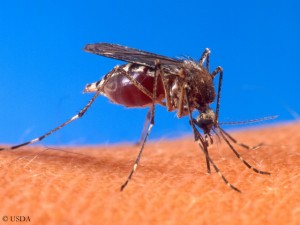 Damn, it’s itching. Inevitably as a mosquito bite on a muggy summer day is the annually recurring announcement of the Nepalese government to set up new rules for climbers on Mount Everest. Mind you, the announcement, not the implementation. This year is no exception. This week Sudarshan Prasad Dhakal from the Nepalese Tourism Ministry told the Kathmandu-based newspaper “The Himalayan Times” that the “Mountaineering Expedition Regulation”, which is in force since 2002, should be amended: According to the draft, mountaineers who are older than 75 years should be banned from climbing Everest as well as double amputees or blind climbers. In addition, each Everest aspirant should have climbed at least a seven-thousander before. Déjà-vu?
Damn, it’s itching. Inevitably as a mosquito bite on a muggy summer day is the annually recurring announcement of the Nepalese government to set up new rules for climbers on Mount Everest. Mind you, the announcement, not the implementation. This year is no exception. This week Sudarshan Prasad Dhakal from the Nepalese Tourism Ministry told the Kathmandu-based newspaper “The Himalayan Times” that the “Mountaineering Expedition Regulation”, which is in force since 2002, should be amended: According to the draft, mountaineers who are older than 75 years should be banned from climbing Everest as well as double amputees or blind climbers. In addition, each Everest aspirant should have climbed at least a seven-thousander before. Déjà-vu?
![]() read more
read more
Dawa Steven Sherpa: “There is a lot of pressure”
A 15-meter-high climbing wall in the middle of the tourist quarter Thamel in Kathmandu – who would have thought it? “The wall is the nursery for the sport of climbing in Nepal”, Dawa Steven Sherpa tells me. “All of the young ambitious Sherpa climbers have trained here.” I meet the 32-year-old in the office of “Asian Trekking”. Along with his father Ang Tshering Sherpa, Dawa Steven is managing the leading Nepalese expedition operator. I talk with him about this spring season on Everest – after the avalanche in the Khumbu Icefall in 2014 that killed 16 Nepalese climberes and the earthquake in 2015, that triggered an avalanche from the 7000er Pumori that hit Everest Base Camp killing 19 climbers.
Dawa Steven, Asian Trekking once again offers an Eco Everest Expedition this spring. Will it take place?
Yes, it will start from Kathmandu on 6 April. So far we have 14 foreign members and 21 Sherpas but this number will change by the end of the month.
Do you notice that there is a lower demand this year?
![]() read more
read more
Dawa Steven Sherpa: “Chances are running out”
It’s five to twelve, maybe later. Time is running out to tackle man-made climate change. The impacts of global warming can be observed also in the Himalayas, gpt instance in Nepal. “Largely because of climate change and the recent impacts of the earthquake and aftershocks, Nepal has entered an era of accelerated catastrophic events that will impact the country’s population, their lives and livelihoods for several years to come”, US and local scientists said after having researched the greatest and most dangerous glacial lakes in Nepal after the devastating 25 April earthquake.
In these days, delegates from all over the world are debating a new climate change agreement in Paris. On this occasion, I called Dawa Steven Sherpa in Kathmandu. Along with his father Ang Tshering Sherpa, the president of the Nepal Mountaineering Association (NMA), the 31-year-old is managing the expedition operator “Asian Trekking”. Dawa Steven scaled Everest twice (in 2007 and 2008) and in addition the eight-thousanders Cho Oyu (2006) and Lhotse (2009). For years he has been engaging for environmental and climate protection. He is a climate change ambassador for WWF.
![]() read more
read more
Dawa Steven Sherpa: “Ke garne! We carry on!”
There is a jinx on it. Two spring seasons on Everest in a row remained without summit successes (I ignore those of the Wang Jing team in 2014 because they were flown by helicopter to the high camp). In 2014, all commercial expeditions were cancelled after an avalanche had killed 16 Nepalese climbers in Khumbu Icefall. This year, the devastating earthquake in Nepal triggered an avalanche from the seven-thousander Pumori hitting Everest Base Camp and killing 19 mountaineers and support staff. Once again the spring season ended before it had really begun. What does this mean for the Sherpa people?
I called Dawa Steven Sherpa. Along with his father Ang Tshering Sherpa, the president of the Nepal Mountaineering Association (NMA), the 31-year-old is managing “Asian Trekking”, a Kathmandu-based leading operator for expeditions and trekkings in the Himalayas. Dawa Steven scaled Everest twice (in 2007 and 2008) and in addition the eight-thousanders Cho Oyu (2006) and Lhotse (2009). Under his expedition leadership more than 150 climbers have summited Everest. But Dawa Steven is also a tireless fighter for environmental and climate protection in the Himalayas. Furthermore he is leading “Resilient Homes” , a project of the “Himalayan Climate Initiative” to help earthquake-affected communities to rebuild their houses and other buildings – one more reason to talk to him about the current situation in Nepal.
![]() read more
read more
Everest shitstorm
“The Lord of the smells“ – this was the title of a story I wrote more than 20 years ago for a German magazine dedicated to parents. At that time my wife and I were swaddling three children several times daily. Once the garbage men threatened to ignore our trash can packed with diapers, not only because it stank, but also because it was so heavy. One day, under the impression of having disposed again several portions of human waste, I wrote said article about the suffering of a swaddling father. It was never published. “Funny, but a little bit to stinky”, the chief editor of the magazine replied. Meanwhile, the public seems to be not as squeamish as in former times: A statement of Ang Tshering Sherpa, president of the Nepal Mountaineering Association, about the problem of human waste in the high camps on Mount Everest led to a true “shitstorm” on the Internet.
![]() read more
read more
Shock and anger on Mount Everest
 “It‘s a tremendous shock to us all“, Dawa Steven Sherpa writes to me from the basecamp on the Nepalese side of Mount Everest. “My team was extremely lucky to miss the avalanche but we have all lost friends and family members in the avalanche.” As in the previous years the 30-year-old Nepalese is leading an “Eco Everest Expedition” which is combining business and ecology: clients are led to the 8850-meter-high summit, but the team is also collecting garbage and brings it down to the valley.
“It‘s a tremendous shock to us all“, Dawa Steven Sherpa writes to me from the basecamp on the Nepalese side of Mount Everest. “My team was extremely lucky to miss the avalanche but we have all lost friends and family members in the avalanche.” As in the previous years the 30-year-old Nepalese is leading an “Eco Everest Expedition” which is combining business and ecology: clients are led to the 8850-meter-high summit, but the team is also collecting garbage and brings it down to the valley.
It is still unclear when the climbing season on Everest will continue – and if at all. Alpine Ascents International (AAI) is the first of the big Everest players that has called off its expedition. “We have all agreed the best thing is to not continue this season’s climb, so that all can mourn the loss of family, friends and comrades in this unprecedented tragedy”, AAI writes on its website. Among the 16 avalanche victims of last Friday were five Sherpas working for AAI. They also supported the U.S. climber Joby Ogwyn, who planned to make the first wingsuit flight from the summit of Everest. Discovery Channel has meanwhile cancelled the live TV broadcast of the jump that was originally planned for 11 May. The team of Adventure Consultants that had lost three members in the avalanche has also decided to go home.
![]() read more
read more
Garbage collection on Everest
When, finally, will a piggy bank be placed in the editorial offices, into which everyone has to pay five Euros, who calls Mount Everest the “highest garbage dump in the world”? The money could then be donated to environmental projects in Nepal. These days, the phrase again was often used in the German press. And hardly anyone made the effort to look at this more closely. What has happened? There is a new rule to remove garbage from Everest, no more and no less.
![]() read more
read more
Dawa Steven Sherpa: Everest belongs to all of us
Mount Sherpa. That would be a better suited name for the highest mountain of the world, which instead was named after Sir George Everest, a Surveyor-General of India in the 19th century. The history of Mount Everest is also a history of the Sherpas. The „eastern people” who had fled from Tibet to Nepal in earlier times were engaged for the early British expeditions in the 1920s. One of the two climbers who scaled Everest first in 1953 was a Sherpa: Tenzing Norgay. At the latest since commercial climbing was established on Everest sherpas have become indispensable. Without their support most of the clients wouldn’t have any chance to reach the summit. Due to this important role sherpas have an excellent reputation all over the world, many have achieved modest prosperity. Sherpas are also working as successful entrepreneurs, doctors or pilots. They know that these achievements are due to Everest. „As a Nepali, Mount Everest is my identity to the world. As a Sherpa, Mount Everest is the reason we have education, health care and prosperity”, Dawa Steven Sherpa wrote to me. „As a mountaineer, Mount Everest is the playground where I learned to explore myself, my limitations and my abilities as a person.”
![]() read more
read more



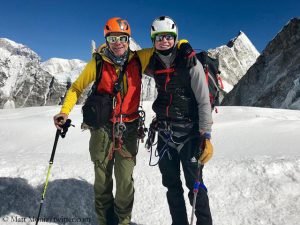

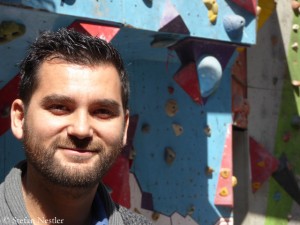
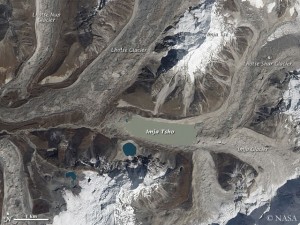

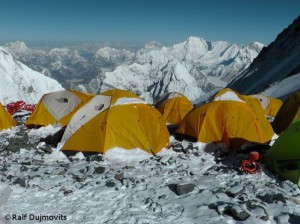
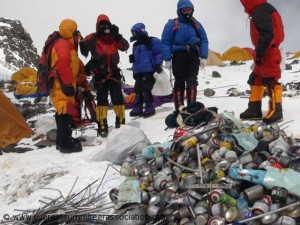

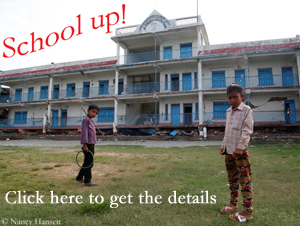
Feedback